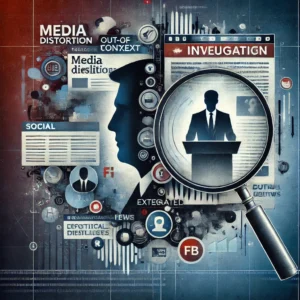
When you make purchases through our links we may earn a small commission.

Photo Credit: Joey Nicotra
Put It On Your Wall: CanvasOnDemand.com
🇺🇸 Support us on Patreon for only $1.99 a month 🇺🇸
🍻 Join us on Facebook @TheSmokingChair 🍻
In a world saturated with information, discerning the truth from falsehood can be a formidable challenge. However, a commitment to seeking the truth requires a rigorous approach that involves demanding objective evidence and steering clear of fallacious arguments. This article explores the importance of these principles in the pursuit of truth and provides insights into how individuals can cultivate a mindset that values evidence over rhetoric.
Demanding Objective Evidence
1. Critical Thinking as a Foundation
Cultivating critical thinking skills is paramount in the quest for truth. Critical thinkers question assumptions, consider alternative perspectives, and, most importantly, demand objective evidence to support claims. This mindset lays the groundwork for a more discerning approach to information.
2. Questioning Authority and Popular Beliefs
Truth often challenges established narratives and conventional wisdom. To unearth objective evidence, individuals must be willing to question authority and critically examine popular beliefs. Objective evidence stands up to scrutiny, regardless of prevailing opinions.
3. Verifiable Sources and Data
Objective evidence is rooted in verifiable sources and data. Whether it’s scientific research, reputable publications, or reliable eyewitness accounts, seeking information from credible sources is essential. Verifiability ensures that the evidence is independently confirmable, reducing the likelihood of bias.
4. Cross-Verification and Corroboration
The truth becomes more apparent when multiple sources independently corroborate the same information. Cross-verification enhances the reliability of evidence and minimizes the risk of falling victim to misinformation or biased perspectives.
Refraining from Fallacious Arguments
1. Recognizing Common Fallacies
Fallacies are flawed patterns of reasoning that can lead individuals away from the truth. By familiarizing oneself with common fallacies, such as ad hominem attacks, strawman arguments, and appeals to emotion, individuals can better identify and avoid deceptive reasoning.
2. Maintaining Objectivity in Emotional Discourse
Emotions can cloud judgment and lead to the acceptance of fallacious arguments. It is crucial to recognize when emotions are influencing one’s perspective and take a step back to reevaluate arguments objectively. Emotional responses often hinder the pursuit of truth.
3. Being Wary of Confirmation Bias
Confirmation bias occurs when individuals favor information that confirms their preexisting beliefs. To combat this, it is essential to actively seek out diverse viewpoints and consider information that challenges personal convictions. This open-minded approach promotes a more honest exploration of the truth.
4. Distinguishing Correlation from Causation
Fallacious arguments often arise from incorrectly assuming that correlation implies causation. Discerning the difference between the two is vital in unraveling complex issues. Scrutinizing the evidence and considering alternative explanations helps avoid the pitfalls of causal fallacies.
Final Thoughts
In the relentless pursuit of truth, demanding objective evidence and avoiding fallacious arguments are indispensable tools. By cultivating critical thinking, questioning assumptions, and embracing a commitment to verifiable information, individuals can contribute to a more informed and truthful discourse. In a world inundated with information, the ability to discern fact from fiction becomes not only a personal responsibility but a collective endeavor to build a more enlightened and rational society.
You’ll get more articles like this – and our favorite promotional offers delivered straight to your inbox.
By submitting this form you agree to our terms and conditions. You can unsubscribe at any time.
- #TAGS: Avoiding Fallacies, Critical Analysis, critical thinking, Evidence Over Rhetoric, fact-checking, Fallacies, fallacies of logic and reasoning, How To Identify a Con Man, how to identify fake news, How To Think, How To Think For Yourself, Information Verification, logic and reasoning, Logical Reasoning, news, Objective Evidence, Partisan for The People, politics, Seeking Truth, Verifiable Sources

🔥 Transparent Sheer Tops Try-On Haul | Camila Elle 🔥

Video: Mira Shape Knitted TRANSPARENT Try-On. YES or NO?

The D Files: Haley’s Role Model

The Short-Term Appeal and Long-Term Risks of MAGA Policies

To ‘Drill, Baby, Drill’ Big Oil Is Saying ‘No, Thanks’

Video: Mira Shape Knitted TRANSPARENT Try-On. YES or NO?

🔥 Transparent Sheer Tops Try-On Haul | Camila Elle 🔥


To ‘Drill, Baby, Drill’ Big Oil Is Saying ‘No, Thanks’

🔥 Transparent Sheer Tops Try-On Haul | Camila Elle 🔥

Video: Mira Shape Knitted TRANSPARENT Try-On. YES or NO?

















